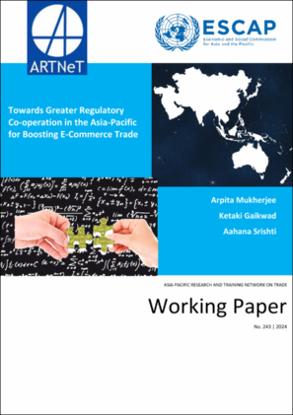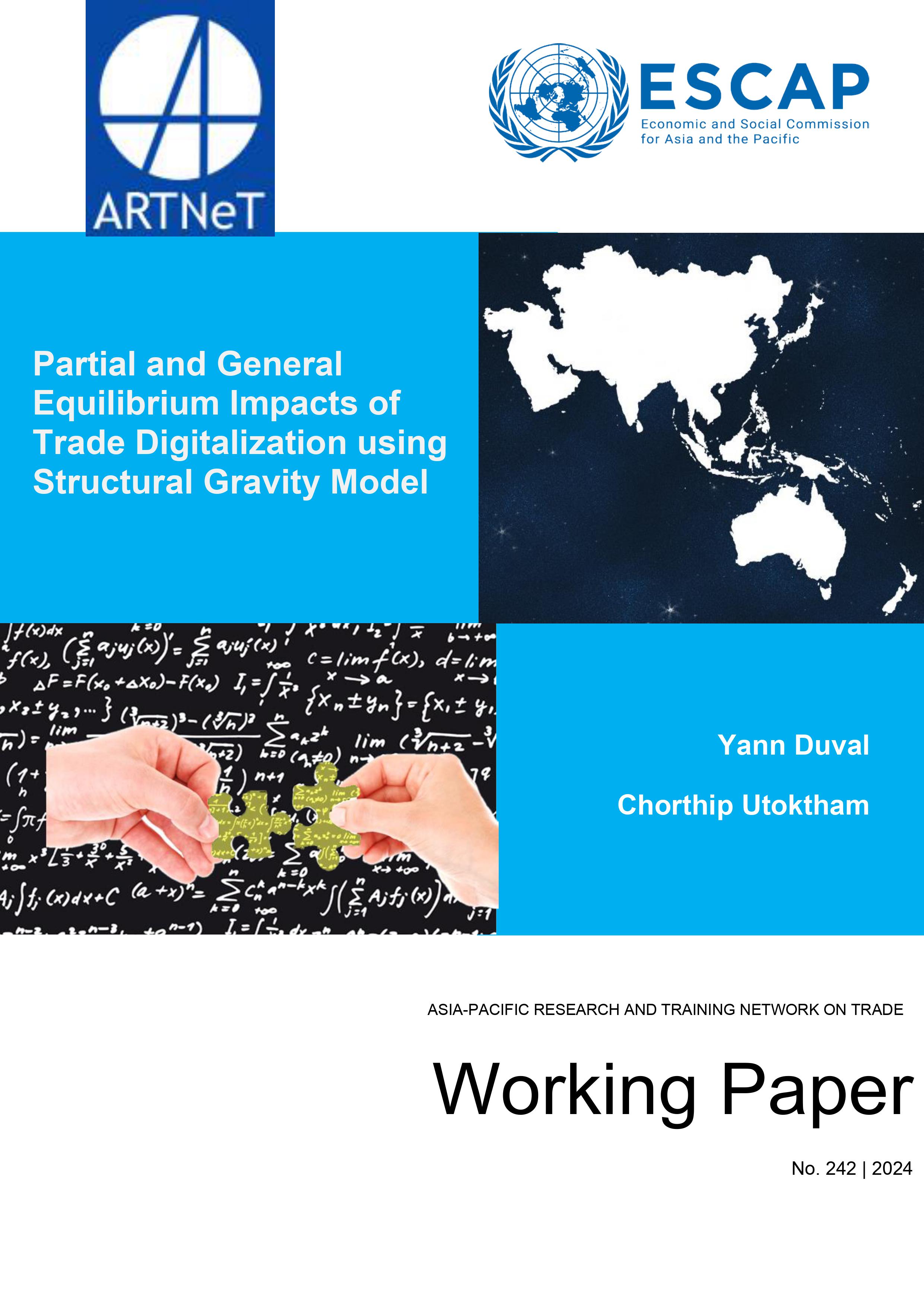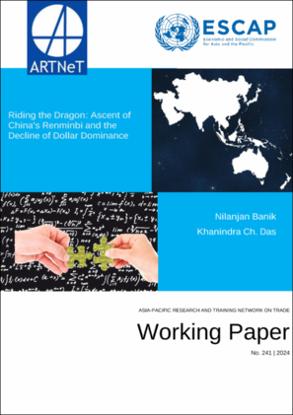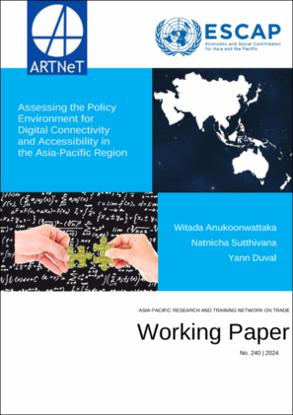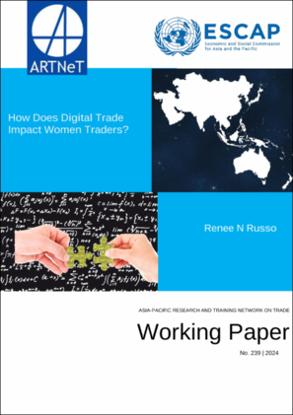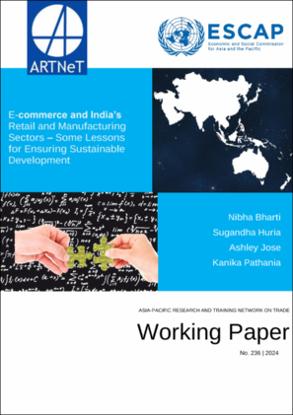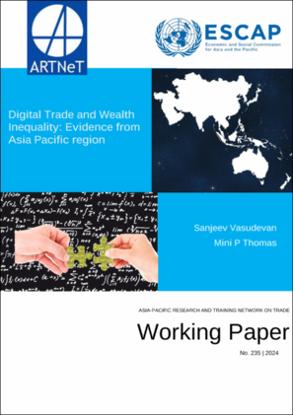Towards greater regulatory co-operation in the Asia-Pacific for boosting e-commerce trade
The Asia-Pacific (APAC) region, which accounts for over 50 per cent of the world’s population and over 35 per cent of the world’s gross domestic product (GDP), is one of the fastest growing regions in the world. The region is growing at higher than the global growth rate and is expected to continue on a high growth trajectory. With high economic growth, the APAC region has become the largest e-commerce market in the world.
Partial and general equilibrium impacts of trade digitalization using structural gravity model
The study estimates partial and general equilibrium impacts of trade digitalization on trade flows using data from the UN Trade Digitalization Index (TDI) 2024 and a structural gravity model. This approach, unlike earlier gravity model studies on the topic, allows for the derivation of both trade and welfare effects associated with trade digitalization. Estimated partial equilibrium effects suggest that a 10 percent increase in trade digitalization may increase trade flows by approximately 8 percent globally. Based on the gravity model estimates, a general equilibrium model is constructed.
Riding the Dragon: Ascent of China's Renminbi and the Decline of Dollar Dominance
Several commentaries are written about de-dollarization. We analyze the factors which are contributing to de-dollarization and provide an alternative assessment. On the economic front, the US economy's reduced fiscal and financial capacity can strain economic trust in the dollar. The internationalization of the Chinese currency is another factor. Additionally, a lower forecast for the world economic growth outlook, a higher debt financing in the US and a war in Europe are also leading to central banks around the world buying more gold and reducing investment in the US treasury bonds.
Assessing the Policy Environment for Digital Connectivity and Accessibility in the Asia-Pacific Region
The digital connectivity in the Asia-Pacific region is primarily shaped by the availability of ICT infrastructure, the nature of regulatory policies, and the dynamics of competition among service providers.
How does digital trade impact women traders?
This paper explores the potential opportunities and challenges digital trade poses for women traders globally and in Asia-Pacific. This paper highlights policy areas using a gendered approach to digital trade. Given the varied and interrelated issues, a public-private-societal effort is needed to help women traders. A mixed methods research approach to conduct situation analysis is used in this paper. It predominantly reviews existing literature, supported by descriptive statistics.
Does Internet expansion matter for export concentration?
Why do export sales increasingly concentrate among a few “superstars”? This paper is the first to argue that the expansion of the Internet matters for this phenomenon. Using firm-level customs transaction data from 11 developing countries, we show that the spread of the internet steepens the slope of the rank-sales relationship among exporters. This shift implies a more skewed distribution of sales toward the top exporters. Furthermore, incumbent superstar exporters are more likely to retain their status owing to a better Internet.
Harnessing digital trade to advance the sustainable development goals : an empirical study
Trade’s profound digital transformation has spurred a new era of digital trade. However, little is known about the impact of digital trade and related policies on sustainable development. To investigate this, our exploratory study employs Fixed-Effects (FE) regressions, linking digital trade variables with all Sustainable Development Goals (SDGs) through SDG targets organized into 4 main areas of development: economic, social, environmental, and governance and global partnerships.
E-commerce and India’s retail and manufacturing sectors – some lessons for ensuring sustainable development
The sudden surge in the e-commerce sector has sparked concerns in several economies in the world, particularly in India. The country’s traders’ associations have complained that the online retail sector (dominated by e-commerce majors) has been growing at the expense of the offline retail sector, primarily the MSMEs. In this context, this study marks one of the initial endeavours to analytically evaluate the impact of the thriving online retail industry on India’s organised manufacturing and retail segments.
Digital trade and wealth inequality : evidence from Asia Pacific region
This paper examines the impact of digital trade on wealth inequality for 40 developed and developing member countries of the UNESCAP Asia Pacific region, for the period from 2005-2021. Data on digital trade, measured using two indicators, namely, trade in digitally deliverable services and trade in ICT goods, is obtained from UNCTAD. Data on within-country wealth inequality, measured using two indicators, namely, wealth share of the top 1 percentile and top 10 percentile of the adult population, is sourced from the World Inequality Database.


